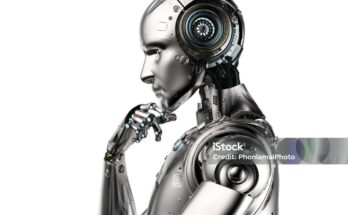The Evolution and Impact of Artificial Intelligence
Introduction
Artificial Intelligence (AI) is no longer just a concept from science fiction movies; it’s a significant part of our daily lives. But what exactly is AI? At its core, AI refers to the simulation of human intelligence in machines designed to think and learn like humans. AI’s importance in modern society cannot be overstated, as it revolutionizes various industries and impacts our everyday lives in profound ways.

History of Artificial Intelligence
Early Concepts and Theories
The journey of AI began long before computers existed. Philosophers and visionaries like Aristotle and Alan Turing laid the groundwork with theories about reasoning and computation. Turing’s question, “Can machines think?” set the stage for AI research.
Major Milestones in AI Development
AI development has seen several significant milestones. The creation of the first computer program that could play chess in the 1950s marked a crucial step. The 1997 victory of IBM’s Deep Blue over world chess champion Garry Kasparov and the recent achievements of Google’s AlphaGo illustrate AI’s rapid advancements.
Types of Artificial Intelligence
Narrow AI
Narrow AI, also known as weak AI, is designed to perform a specific task, such as facial recognition or internet searches. It’s the most common form of AI we encounter daily, like virtual assistants Siri and Alexa.
General AI
General AI, or strong AI, refers to a machine that possesses the ability to understand, learn, and apply knowledge across a wide range of tasks at the same level as a human. While this remains largely theoretical, it represents a significant goal for AI researchers.
Superintelligent AI
Superintelligent AI surpasses human intelligence in all aspects, from creativity to problem-solving. Though it’s a concept currently found in science fiction, it poses intriguing possibilities and significant ethical questions.
Key Technologies Behind AI
Machine Learning
Machine learning, a subset of AI, involves training algorithms to learn from and make predictions based on data. It’s like teaching a child to recognize patterns, and it’s the driving force behind many AI applications.
Deep Learning
Deep learning, a more advanced form of machine learning, uses neural networks with many layers (hence “deep”) to analyze vast amounts of data. This technology powers image and speech recognition systems.
Neural Networks
Neural networks are computational models inspired by the human brain’s structure. They consist of interconnected nodes (neurons) that process information in a way similar to how our brains do, enabling machines to recognize patterns and solve complex problems.
Natural Language Processing
Natural Language Processing (NLP) allows machines to understand and respond to human language. It’s the technology behind chatbots and language translation services, making interactions with machines more intuitive.
Applications of Artificial Intelligence
Healthcare
AI is transforming healthcare by improving diagnostics, personalizing treatment plans, and predicting patient outcomes. For instance, AI algorithms can analyze medical images faster and more accurately than human radiologists.
Finance
In finance, AI helps in fraud detection, risk management, and algorithmic trading. It enables banks to provide personalized services and streamline operations, enhancing customer experience.
Education
AI in education personalizes learning experiences, automates administrative tasks, and provides intelligent tutoring systems. It helps educators identify student needs and adapt teaching methods accordingly.
Transportation
Self-driving cars and traffic management systems are prime examples of AI in transportation. These technologies promise to reduce accidents, optimize routes, and improve fuel efficiency.
Entertainment
From recommendation systems on streaming platforms to AI-generated content, AI is reshaping the entertainment industry. It personalizes user experiences and even creates new forms of entertainment.
Benefits of Artificial Intelligence
Increased Efficiency
AI automates routine tasks, allowing humans to focus on more complex and creative endeavors. This leads to increased productivity and efficiency across various sectors.
Improved Decision Making
AI analyzes vast amounts of data to provide insights and recommendations, aiding decision-making processes. Businesses and governments use AI to make more informed and timely decisions.
Enhanced Customer Experiences
AI-powered chatbots, personalized recommendations, and 24/7 customer support enhance user experiences, making interactions more seamless and enjoyable.
Challenges and Risks of AI
Ethical Concerns
AI raises ethical issues such as bias in algorithms, privacy concerns, and the potential misuse of technology. Ensuring that AI is developed and used responsibly is a significant challenge.
Job Displacement
While AI creates new opportunities, it also poses a risk of job displacement, particularly in industries reliant on routine tasks. Preparing the workforce for these changes is crucial.
Security Issues
AI systems can be vulnerable to cyber-attacks and manipulation. Ensuring robust security measures is essential to protect sensitive data and maintain trust.
Future of Artificial Intelligence
Potential Advancements
The future of AI holds exciting possibilities, from advancements in quantum computing to the development of more sophisticated AI models. These innovations will likely push the boundaries of what AI can achieve.
Impact on Various Industries
AI’s impact will continue to grow across industries, driving innovation and efficiency. Healthcare, finance, and education are just a few areas that will see significant transformations.
AI in Everyday Life
AI will become even more integrated into our daily lives, from smart homes to personalized digital assistants. The convenience and capabilities of AI will shape the future of our interactions with technology.
Conclusion
Artificial Intelligence is a rapidly evolving field that holds immense potential and significant challenges. Its impact on various industries and everyday life is profound, making it essential to understand and navigate its complexities responsibly. As we look to the future, embracing AI’s benefits while addressing its risks will be key to harnessing its full potential.
FAQs
What is Artificial Intelligence?
Artificial Intelligence is the simulation of human intelligence processes by machines, especially computer systems. These processes include learning, reasoning, and self-correction.
How does AI impact everyday life?
AI impacts everyday life through applications like virtual assistants, personalized recommendations, and smart home devices, making daily tasks more convenient and efficient.
What are the main types of AI?
The main types of AI are Narrow AI, designed for specific tasks; General AI, which can perform any intellectual task like a human; and Superintelligent AI, which surpasses human intelligence in all aspects.
How is AI used in healthcare?
AI is used in healthcare for diagnostics, personalized treatment plans, and predicting patient outcomes. It improves accuracy and efficiency in medical procedures and patient care.
What are the ethical concerns surrounding AI?
Ethical concerns surrounding AI include algorithmic bias, privacy issues, and the potential for misuse. Ensuring responsible AI development and deployment is crucial to addressing these concerns.


